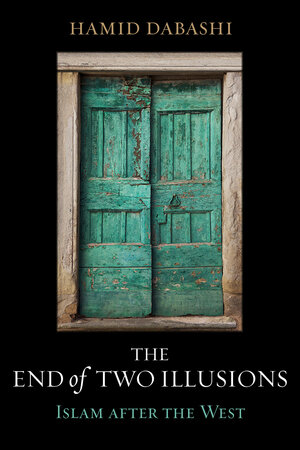By Hamid Dabashi, author of The End of Two Illusions: Islam after the West
So often we hear allusion to this idea of “Islam and the West.” A product of colonialism, this false and dangerous binary has created ongoing enmity and an illusion of two divided worlds. What do we even mean when we say “Islam and the West”? Islam is a multifaceted world religion, impossible to fix on any single position, similar to Christianity or Judaism. “The West” is a recent civilizational construct—replacing the older construct of Christendom—based on capitalist modernity with Europe as its presumed epicenter.
Yet capitalism has no center—it has always been global and amorphous. This idea of “The West” is therefore an ideological delusion. The civilizational conflict assumed between Islam and the West is of a recent, colonial vintage. And today, political events centered in the region called “the Middle East” have created a militarized ideological spin that has trapped these two abstractions into an unending fictional confrontation.
I was led to this book after a lifetime of scholarly work on the historical, political, cultural, and civilizational dimensions of Islam as a world religion, and its varied encounters with the world around it. The purpose of my book, The End of Two Illusions: Islam after the West is to disengage this false binary and liberate our lived realities from this unending confrontation. The result of doing so is a different mode of reading and addressing more urgent, global issues that are irreducible to this or any other false consciousness. My book is dedicated to clearly identifying the colonial conditions of this contrived confrontation and then overcoming it.
How did this fabricated opposition come to be? This is not an innocent binary. The assumption of an innate and irreconcilable relationship between these two entities—“the West” as secular, modern, and scientific, and “Islam” as fanatical, traditional, violent, and superstitious—has been detrimental to world peace. This ideological opposition has been at the root of presumed hostilities and has taken our attention away from far more real and urgent matters.
I wrote this book for my readers to begin to think of the fragility of the earth on which we all live. My hope is to bring humanity together to address far more real issues—such as climate change, militarized and militant confrontations, massive refugee crisis and labor migrations, global pandemics like Covid and scarcity of public health infrastructures, out of control gun violence, race and gender discriminations. These are the real issues we as temporary guests on this earth face and they are urgent and compelling for the entire planet—regardless of the races, genders, and ethnicities we have invented for ourselves and imposed on others.
I often use the example of a boat sinking in the dangerous waters of the Mediterranean sea. That boat full of desperate refugees and migrants is neither from the East nor from the West, neither Islamic nor Christian, neither Black nor White, neither solely male nor exclusively female. It carries refugees from the most vulnerable parts of the world to the most unwelcoming — human beings that need our help. Continuing to get caught up in arguments about false ideological divisions that overlook our shared humanity, keeps us from taking important action and protecting life. If I were to suggest one chapter for my readers to focus on it would be Chapter Eight, “Nations without Borders,” where I discuss the common transnational bourgeois public sphere where European fascination with things Persian, or their Persophilia, goes global. The reason for this globalization of aspects of Persian culture is the way European colonialism spread itself around the world. Take the case of the global popularity of Edward FitzGerald’s translation of Rubaiyat of Omar Khayyam, or Goethe’s fascination with Hafez in his West–östlicher Divan, or Mozart’s and Nietzsche’s respective takes on the Persian prophet Zoroaster—or Montesquieu’s Persian Letters, to mention just a few among myriad of other examples. These cultural events and iconic registers of European artistic history became integral to the formation of a global public sphere where the forceful and ideological divide between East and West or Islam and the West is no longer valid or even operative.

